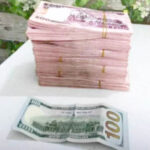Manufacturers and Nigerians in general are apprehensive about the future of the naira following last week’s free fall which saw the naira-dollar exchange rate end one of its worst-ever weeks in recent history for the Nigerian Autonomous Foreign Exchange Market (NAFEM, formerly I& E window) and parallel market respectively.
From June to September, the average exchange rate surged by about 20%, from an average rate of N634.56/$ in June to N761.33/% in September.
This trend has continued, with the exchange rate climbing even further, reaching N859.73/$ as of October 19, 2023.
The total turnover recorded for the entire week at the NAFEM window amounted to $423.9 million, compared to the $646.6 million recorded the previous week, resulting in a decline of $222m.
- Birnin Gwari villagers raise alarm over Ansaru militants’ presence
- 3 police inspectors caught extorting Okada riders in Ogun
As of October 19, 2023, the external reserve stood at $33.3 billion. The external reserves have remained at the $33.3 billion level since September 6, 2023, indicating that the apex bank has yet to inject the expected supply into the market.
It’s worth noting that Nigeria’s external reserve was $35 billion when the Tinubu administration took office on May 29, 2023.
Since then, the exchange rate at the parallel market has plummeted by 36%.
Meanwhile, rates closed at N808/$1 and N1170/$1 on the official and black markets, respectively.
This decline signifies a substantial 5.4% drop on the official NAFEM window, marking the lowest levels recorded at the end of a week in Nigeria’s exchange rate market history.
The last time the exchange rate closed the week above N800 was on July 14, when it settled at N803.90.
Weaker naira across all markets
The exchange rate fell to an all-time weak closing day rate of N848.12 on October 17, 2023, and also hit an “intra-day high” of N999 during the week as the official market moved closer to realities on the street.
In the parallel markets, where the exchange rate is unofficially traded, quotes ranged from around N1,040 to N1,175/$1, with some transactions quoting as high as N1200/$1.
This represents a remarkable 10% depreciation within a week, a trend last witnessed around November 2022 during a period of wild volatility.
The pervasive weakening observed across markets suggests that a bottoming out is not in sight, at least not until there is an improvement in supply.

 Join Daily Trust WhatsApp Community For Quick Access To News and Happenings Around You.
Join Daily Trust WhatsApp Community For Quick Access To News and Happenings Around You.


